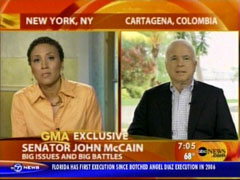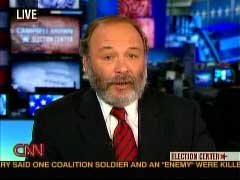|
1. ABC's GMA Scolds Globe-Trotting McCain as People Suffer at Home
Good Morning America on Wednesday attempted to guilt trip John McCain for taking a foreign trip: "As Americans wrestle with a tough economy, why is he in South America?" Five times over the course of two segments, various GMA hosts, reporters and analysts insinuated that McCain's trip to Colombia and Mexico might result in voters thinking he doesn't care about the economic situation of Americans. Correspondent Bianna Golodryga pointedly wondered: "But at a time when polls show Obama ahead of McCain by 16 points on the economy, should McCain be staying closer to home?" GMA co-host Robin Roberts, in an interview with Senator McCain, questioned: "So, why is Senator McCain abroad when Americans are focused on the economy here at home and losing jobs, more and more jobs, as Bianna just reported?" The candidate replied by mentioning the fight against the Colombian drug trade as one reason for his South American trip. Undeterred, Roberts continued her theme. She repeated: "We've seen that over and over again, so many want to know, other than what you just said, why are you in Colombia this morning?" This prompted an irritated McCain to reply: "Well, I'd be glad to repeat myself."
2. CBS's Ben Tracy: Not 'Enough Left' After Gas to Go to Starbucks
With Starbucks' announcement that it will closing 600 of its locations nationwide, the network morning shows on Wednesday heralded this news as another sign of a bad economy, as if anyone will notice 600 fewer Starbucks locations when there are so many. ABC's Bianna Golodryga on Good Morning America lamented that "Americans are struggling just to pay for a cup of Starbucks coffee." NBC's Matt Lauer's clever headline: "Trouble brewing -- Starbucks announces its closing 600 stores in the next year. Is the demand for $4 lattes dying in a tough economy?" But CBS's The Early Show took the puns and the "doom and gloom" to a new level. Host Maggie Rodriguez teased the headline news: "Starbucks shutting its doors on hundreds of stores. Tough economic times or just a grande letdown?" Correspondent Ben Tracy, in his report on the closings, quipped: "The economic slowdown has been a real grind for Starbucks' profits. After filling up their gas tanks, some coffee lovers don't have enough left to fill up their cups."
3. Early Show: Penguins 'Canaries in Coal Mine' on Global Warming
On Wednesday's CBS Early Show, co-host Maggie Rodriguez teased an upcoming segment on global warming by fretting: "Are penguins sending us warning signs about global warming?" Later, correspondent Debbye Turner talked to biologist Dee Boersma, who claimed that "penguins are the canaries in the coal mine. Penguins are telling us, as marine sentinels, that our southern oceans are changing." Boersma, who according to newsmeat.com donated $1,000 to John Kerry's 2004 presidential campaign, went on to condemn a wide range of human activity that she felt was harming global penguin populations: "Penguins are affected not only by climate variation and climate change, but they're affected by lots of activities that we do from moving oil around, because we spill oil, from plastics that we dump into the oceans, to fishing that takes away their food." Earlier in the segment, Turner lamented: "We've all seen pictures like these. Polar bears in danger because global warming is literally melting their habitat. But they are far from the only animal affected by climate change."
4. Time Mag: Kill AC, 'For Good of Country, We Should Be Sweating'
Time political columnist Joe Klein's article in the magazine this week was titled "Kill Your Air Conditioner." Klein detests the quality of air-conditioned air, and thinks everyone in America ought to live to his tastes: "The unnecessary refrigeration of America has become a chronic disease." Air-conditioning is "bad for the planet," he wrote, but "unfortunately, it is not as bad as I'd like it to be." He sided with Jimmy Carter and the "dreadful cardigan sweater" over the Bush-Cheney policy of "malignant neglect." Klein advocated breaking out the thermostat police as a presidential campaign issue: "I'd like to see both candidates call for an immediate 5deg.F thermostat adjustment, just to get the conservation ball rolling." The column's subhead in the July 7 edition of the magazine: "Solving the energy crisis requires sacrifice. For the good of the country, we should be sweating."
5. Newsworthy: Long Sunday NYT Profile Gives Limbaugh a Fair Shake
When the New York Times runs a long profile of Rush Limbaugh that doesn't actually caricature its subject as a bombastic, cigar-chomping mocker of the downtrodden, that's news in itself. On Wednesday morning the Times posted its upcoming profile of Rush Limbaugh in this Sunday's magazine. The packaging was unpromising with the headline "Late-Period Limbaugh," and the teaser: "Bush is wildly unpopular. McCain is nobody's idea of a movement guy. Conservatism is cracking up. What's the king of talk radio to do?" The headline and teaser suggested the article would revel in Limbaugh's supposed decline in influence (perhaps the only way to tempt the paper's liberal readership to actually read a long article about Limbaugh). Those details, along with the slightly sinister black-and-white photos of Limbaugh puffing on a cigar, will understandably make Limbaugh fans brace for the usual uncomprehending liberal slant. But writer Zev Chafets treated his subject as a human personality, with a lot of help from the consistently self-effacing Limbaugh.
6. You Read It Here First: FNC Picks Up Spiking of Good News on Iraq
FNC's Brit Hume led his Wednesday night "Grapevine" segment by marveling that though "you might have thought it was big news Tuesday when the administration reported to Congress that Iraq had made satisfactory progress on 15 of 18 political benchmarks set by the U.S.," up from progress on only eight a year earlier, "the Media Research Center says there was not a word about the report on the CBS Evening News, NBC Nightly News or ABC's World News Tonight." Hume added that "the New York Times also ignored the story, and the Washington Post relegated its coverage to page eight," before he expressed astonishment at the AP's spin: "And this -- and I'm not making this up -- is how the Associated Press began its story on the report: 'No matter who's elected President in November, his foreign policy team will have to deal with...the slow pace with which the government in Baghdad operates.'"
 ABC's GMA Scolds Globe-Trotting McCain ABC's GMA Scolds Globe-Trotting McCain
as People Suffer at Home
 Good Morning America on Wednesday attempted to guilt trip John McCain for taking a foreign trip while "Americans wrestle with a tough economy." Five times over the course of two segments, various GMA hosts, reporters and analysts insinuated that McCain's trip to Colombia and Mexico might result in voters thinking he doesn't care about the economic situation of Americans.
Good Morning America on Wednesday attempted to guilt trip John McCain for taking a foreign trip while "Americans wrestle with a tough economy." Five times over the course of two segments, various GMA hosts, reporters and analysts insinuated that McCain's trip to Colombia and Mexico might result in voters thinking he doesn't care about the economic situation of Americans.
Correspondent Bianna Golodryga pointedly wondered: "But at a time when polls show Obama ahead of McCain by 16 points on the economy, should McCain be staying closer to home?" GMA co-host Robin Roberts, in an interview with Senator McCain, questioned: "So, why is Senator McCain abroad when Americans are focused on the economy here at home and losing jobs, more and more jobs, as Bianna just reported?" The candidate replied by mentioning the fight against the Colombian drug trade as one reason for his South American trip. Undeterred, Roberts continued her theme. She repeated: "We've seen that over and over again, so many want to know, other than what you just said, why are you in Colombia this morning?" This prompted an irritated McCain to reply: "Well, I'd be glad to repeat myself."
[This item, by the MRC's Scott Whitlock, was posted Wednesday afternoon on the MRC's blog, NewsBusters.org: newsbusters.org ]
In a tease for both segments, co-host Diane Sawyer queried: "This morning, one-on-one with John McCain. As Americans wrestle with a tough economy, why is he in South America?" ABC News political contributor Matthew Dowd piled on: "[McCain] risks not talking to voters and where they are and what they want to vote on. Taking a trip to Colombia, I think, voters may see as a distraction from what they really care about right now." (Although Dowd is a former strategist to President Bush, he has also worked on Democratic campaigns.)
The journalists on GMA seem to be ignoring the fact that it's July. The conventions are in August and the campaign will be a sprint from Labor Day to Election Day. This would seem to be the time for foreign trips. It's rather silly for ABC reporters to suggest a summer visit to South America means the Arizona Senator is uncaring towards tough economic times. And it will be interesting to see how these same correspondents cover Democrat Barack Obama's excursion to the Middle East in early August.
A transcript of the July 2 Robin Roberts interview with John McCain, which aired at 7:04am:
7am tease, DIANE SAWYER: This morning, one-on-one with John McCain. As Americans wrestle with a tough economy, why is he in South America? We'll ask him in a GMA exclusive.
....
ROBIN ROBERTS: So, why is Senator McCain abroad when Americans are focused on the economy here at home and losing jobs, more and more jobs, as Bianna just reported? For the answer, we go to the Republican candidate in Colombia, in the midst of a three-day visit to that country and Mexico. Senator McCain, thank you very much for joining us this morning. We certainly do appreciate it. You know that-
SENATOR JOHN McCAIN: Thank you, Robin. I'm here -- let me say I'm here for one day. I'm in Mexico the next day then I'm back home and, you know, also drugs is a big, big problem in America. The continued flow of drugs from Colombia through Mexico into the United States is still one of our major challenges to all Americans and Mexican government is struggling right now with battles against drug cartels, Colombia continues to make progress, but a large percentage of the amount of cocaine that continues to come into the United States of America comes from this country. I've been here many times. I've been here several times in the past, as well as with Mexico and I think that it deserves our attention.
ROBERTS: No discounting the drug problem, as you just stated. Here at home, the U.S. economy is really at the forefront of voters' minds. We've seen that over and over again, so many want to know, other than what you just said, why are you in Colombia this morning?
McCAIN: Well, I'd be glad to repeat myself. I've come down here on two previous occasions. We have the issue of the drug trafficking from Colombia up through our hemisphere across Mexico and in the United States of America. Drug cartels have basically taken control of some towns on the Mexican border. There are still a couple of thousand people being held hostage by the FARC here. There is clearly a continued threat of drugs pouring into the United States of America, which can harm us and our young people very badly. I'm happy to say that there has been some success. The cost of cocaine on the street is up. I also think it's important for our economy to maintain a free -- to pass a free trade agreement between ourselves and Colombia. Colombia is our largest agricultural market in the southern hemisphere. So, I think there are issues. I've been involved in these issues for a long, long time, and I've spent the last two weeks talking about all over America, the need for us to attain energy independence and I've come up with specific plans and proposals to do that. The American economy is hurting right now. Most of all at the gas pump where they're seeing the price of a gallon of gas go up and up and up.
ROBERTS: You mention free trade and it is part of the reason why you are making the trip to Colombia and to Mexico. Again, here at home, many are very fearful of when it comes to foreign free trade and, in fact, there was a new poll, over half the country feeling it's a threat to the country. 41 percent do see it as an opportunity for growth. Senator, you recently spent time in Indiana and in Pennsylvania, spending a lot of time in communities there that have been hit really hard with job losses. So what do you say to those people, what do you say to those people who are fearful that more jobs may be, indeed, headed beyond our borders and abroad?
McCAIN: That our economy is in terrible shape, that we've got to take specific actions, keep their taxes low, less regulation, start exploring and exploiting offshore oil deposits so that we can at least ease this burden, give them a little bit of a break from their gas taxes, get to work on nuclear, solar, wind, tide, invest in pure research and development and coal -- clean coal technology. We must also, I believe, stop distorting the market by subsidizing ethanol and preventing sugar based ethanol from coming in the United States. I know Americans are hurting very badly right now. I have town hall meetings almost every single day and I have a plan of action to bring our economy out of the situation it's in today. And I don't believe increasing their taxes is the answer. I believe leaving their taxes low, get off this dependence on foreign oil and doing it quickly and we can -- I call it the Lexington Project. We can, as we sent people to the moon, we can also get off this dependence on foreign oil and keep people in their homes and stop this job loss. We can do it.
ROBERTS: We can do it. You have admitted that you're not exactly an expert when it comes to the economy and many have said-
McCAIN: I have not. I have not. Actually, I have not. I said that I am stronger on national security issues because of all the time I spent in the military. Very strong on the economy. I understand it. I have a lot more experience than my opponent.
ROBERTS: People feel that it is not a strong suit. You have other strengths, as well, but that if you selected somebody from the business sector as a running mate, that it could go a long way for you. Mitt Romney's name has come up again, very successful, of course, with business ventures. Is he somebody that's at the top of your VP list?
McCAIN: Robin, Mitt Romney is a great person and he's done a great job for us and we're really pleased at the cooperation and help that he's given us and he won millions of Republican votes so there will be a big place for him in the Republican Party in the future, but obviously we're not talking about specific candidates. Thanks for asking, though.
ROBERTS: Well, that's what I do. Senator, thank you so much.
McCAIN: Absolutely.
ROBERTS: I do have a final question. Are you in a bird sanctuary or something? We're hearing a lot of birds around you this morning there.
McCAIN: Actually we're in one of the most beautiful cities on Earth, Cartagena, a very old city. The Spaniards used to collect their gold and take it back to Spain. And we're out on this little island and it's really lovely here and they encourage tourism here too.
ROBERTS: It looks like a beautiful spot. Senator John McCain, thank you. I know we'll be talking a lot between now and November. Thank you so much. Have a good trip.
  CBS's Ben Tracy: Not 'Enough Left' After CBS's Ben Tracy: Not 'Enough Left' After
Gas to Go to Starbucks
 With Starbucks' announcement that it will closing 600 of its locations nationwide, the network morning shows on Wednesday heralded this news as another sign of a bad economy, as if anyone will notice 600 fewer Starbucks locations when there are so many. ABC's Bianna Golodryga on Good Morning America lamented that "Americans are struggling just to pay for a cup of Starbucks coffee." NBC's Matt Lauer's clever headline: "Trouble brewing -- Starbucks announces its closing 600 stores in the next year. Is the demand for $4 lattes dying in a tough economy?"
With Starbucks' announcement that it will closing 600 of its locations nationwide, the network morning shows on Wednesday heralded this news as another sign of a bad economy, as if anyone will notice 600 fewer Starbucks locations when there are so many. ABC's Bianna Golodryga on Good Morning America lamented that "Americans are struggling just to pay for a cup of Starbucks coffee." NBC's Matt Lauer's clever headline: "Trouble brewing -- Starbucks announces its closing 600 stores in the next year. Is the demand for $4 lattes dying in a tough economy?"
But CBS's The Early Show took the puns and the "doom and gloom" to a new level. Host Maggie Rodriguez teased the headline news: "Starbucks shutting its doors on hundreds of stores. Tough economic times or just a grande letdown?" Correspondent Ben Tracy, in his report on the closings, quipped: "The economic slowdown has been a real grind for Starbucks' profits. After filling up their gas tanks, some coffee lovers don't have enough left to fill up their cups."
[This item, by the MRC's Matthew Balan, was posted Wednesday afternoon on the MRC's blog, NewsBusters.org: newsbusters.org ]
Tracy began his report, which began six minutes into the 7 am Eastern hour with another coffee reference, that "[t]he now ubiquitous green coffee giant has decided its time to decaffeinate itself." He then detailed Starbucks' plan and used a sound bite from a professor who attributed part of the problem to the company becoming "too big." He followed this with his "gas tanks" line:
TRACY: The company already planned to shed 100 of its stores. Now it will close a total of 600 underperforming outlets in the coming months, cutting up to 12,000 of its workers. USC marketing professor Lars Perner says Starbucks became too big just as consumers cut back.
LARS PERNER: I think these 600 may be just the beginning of the ones to come. They may have to close even more of them over time.
TRACY: The economic slowdown has been a real grind for Starbucks profits. After filling up their gas tanks, some coffee lovers don't have enough left to fill up their cups.
RACHEL PRESTON: People are spending less money on coffee because there's more important things to spend their money on, like gas.
TRACY: Starbucks CEO Howard Schultz, recently brought back to reinvigorate the company, said in a statement that closing the stores is 'the most angst-ridden decision' he has made in his more than 25 years with Starbucks. But the company says this is part of its plan to return Starbucks to its roots and win back customers. Which also includes the recently launched Pike Place Roast, named after Starbucks' first location in Seattle. If you're starting to worry about getting your Starbucks fix, don't. Despite these store closings, there are still more than 10,000 Starbucks left to keep you caffeinated. Ben Tracy, CBS News, Los Angeles.
 Golodryga's Good Morning America report underlined the importance of the economy as an issue in the general election, and used the Starbucks closures as "just the latest sign of an economy in trouble." The following is the transcript of the beginning of the report, which aired near the top of the 7 am Eastern hour:
Golodryga's Good Morning America report underlined the importance of the economy as an issue in the general election, and used the Starbucks closures as "just the latest sign of an economy in trouble." The following is the transcript of the beginning of the report, which aired near the top of the 7 am Eastern hour:
DIANE SAWYER: ...Tuesday, Starbucks announced that it is shutting down hundreds of coffee shops across the country in the wake of disappointing sales, as families, of course, wrestle with far more central and important struggles. But will this election deliver the answers? We're going to be talking to John McCain, Senator McCain, in just a moment. But first we'll turn to ABC's Bianna Golodryga. Bianna?
BIANNA GOLODRYGA: Good morning, Diane. It is just the latest sign of an economy in trouble. While Wall Street is struggling to remain profitable, Americans are struggling just to pay for a cup of Starbucks coffee. Now, the presidential candidates say that they know how to help, but, of course, as always, actions speak louder than words. With corporate icon Starbucks announcing Tuesday it's closing eight percent of its stores, 600 in all, the same day auto sales sunk 18 percent, and Wall Street teetered on the edge of a bear market, experts say the signs for the economy are troubling....
Besides Lauer's "trouble brewing" line, the Today show presented a more balanced explanation of the coffee retailer's woes. Correspondent Amy Robach quoted author Karen Blumenthal, who had the same line of thinking as the expert on "The Early Show." She attributed the closures to Starbucks' expansion of locations over the past few years, which "over-saturated the marketplace." But Blumenthal, in one of her two sound bites, couldn't avoid using the word "recession."
The transcript of Robach's report, which aired 12 minutes into the 7 am Eastern hour of Today:
 ROBACH: The coffee giant is in need of a pick-me-up. On Tuesday, the Seattle company announced it will be closing 8.5% of its U.S. company-operated stores by March of 2009.
ROBACH: The coffee giant is in need of a pick-me-up. On Tuesday, the Seattle company announced it will be closing 8.5% of its U.S. company-operated stores by March of 2009.
UNIDENTIFIED MAN (outside a Starbucks): It's probably the sign of the times due to business and lack of.
ROBACH: With over 11,000 locations nationwide, the world's largest coffeemaker did not name specific Starbucks, but said the closings will be across all major U.S. markets.
KAREN BLUMENTHAL, AUTHOR, "GRANDE EXPECTATIONS:" Starbucks used to think they were recession-proof, that nothing could affect their sales.
ROBACH: The author of 'Grande Expectations' says the company over-saturated the marketplace.
BLUMENTHAL: And I think they probably opened up too many stores, especially, given what's happened in the economy in the last year or two.
ROBACH: What some have called the 'latte index' has crashed as consumers cut back on name-brand coffee.
UNIDENTIFIED FEMALE (outside a Starbucks): I don't think use the Starbucks as much as I used to.
ROBACH: Also facing tough competition from Dunkin' Donuts and McDonald's, Starbucks' spokesperson said 70% of the underperforming locations to be closed are stores opened since 2006, during the company's rapid expansion.
HOWARD SCHULTZ, STARBUCKS CEO: I think very few things in America that have gotten big have stayed good. I think that's true. We're very mindful of that.
ROBACH: Last year, the CEO of Starbucks, Howard Schultz, defended the company's unprecedented growth.
SCHULTZ: We can get big and stay small, and, I think, embraced the heritage and the tradition of traditional coffeehouse.
ROBACH: Starbucks' stock has lost 48% of its value since 2006. Forced to brew a new business plan, the company also plans to turn 7% of its work force.
  Early Show: Penguins 'Canaries in Coal Early Show: Penguins 'Canaries in Coal
Mine' on Global Warming
 On Wednesday's CBS Early Show, co-host Maggie Rodriguez teased an upcoming segment on global warming by fretting: "Are penguins sending us warning signs about global warming?" Later, correspondent Debbye Turner talked to biologist Dee Boersma, who claimed that "penguins are the canaries in the coal mine. Penguins are telling us, as marine sentinels, that our southern oceans are changing." Boersma, who according to newsmeat.com donated $1,000 to John Kerry's 2004 presidential campaign, went on to condemn a wide range of human activity that she felt was harming global penguin populations: "Penguins are affected not only by climate variation and climate change, but they're affected by lots of activities that we do from moving oil around, because we spill oil, from plastics that we dump into the oceans, to fishing that takes away their food."
On Wednesday's CBS Early Show, co-host Maggie Rodriguez teased an upcoming segment on global warming by fretting: "Are penguins sending us warning signs about global warming?" Later, correspondent Debbye Turner talked to biologist Dee Boersma, who claimed that "penguins are the canaries in the coal mine. Penguins are telling us, as marine sentinels, that our southern oceans are changing." Boersma, who according to newsmeat.com donated $1,000 to John Kerry's 2004 presidential campaign, went on to condemn a wide range of human activity that she felt was harming global penguin populations: "Penguins are affected not only by climate variation and climate change, but they're affected by lots of activities that we do from moving oil around, because we spill oil, from plastics that we dump into the oceans, to fishing that takes away their food."
Earlier in the segment, Turner lamented: "We've all seen pictures like these. Polar bears in danger because global warming is literally melting their habitat. But they are far from the only animal affected by climate change." She later discussed the dire situation facing penguins: "Academy award winning documentary March of the Penguins chronicled the Emperor Penguins amazing struggle to reproduce and survive. Experts say because of soaring temperatures and decreasing ice that the day could come that they make their final march."
[This item, by the MRC's Kyle Drennen, was posted Wednesday afternoon on the MRC's blog, NewsBusters.org: newsbusters.org ]
Near the end of the segment, Boersma warned: "We can't just hope that the wildlife can make it. There's not any place that's left for them. So we're going to have to pay more attention and change how humans do business." Turner and co-host Julie Chen concluded the segment by expressing their concern:
TURNER: And that's really her message. Now there are some penguin colonies around the world that are doing better, but many of them are really suffering, like the African Penguin now has only about 60,000 numbers worldwide and that's from, at one time, 1 billion. So this is a-
JULIE CHEN: Wow, incredible.
TURNER: -big problem we've got to keep our eye on.
CHEN: Absolutely.
(On Tuesday night, ABC's World News aired a similarly-themed story about penguins as a warning sign to humans.)
Here is the full transcript of the July 2 CBS Early Show segment in the 7 am half hour:
MAGGIE RODRIGUEZ: Coming up next, are penguins sending us warning signs about global warming?
7:22AM SEGMENT:
JULIE CHEN: A biology professor at the University of Washington claims that the number of penguins in the wild are dwindling at an alarming rate. Early Show correspondent and resident veterinarian Dr. Debbye Turner is in the Bronx with more. Debbye good morning.
DEBBYE TURNER: Good morning to you, Julie. I'm here at the Wildlife Conservation Society's Bronx Zoo. I'm ready to feed the penguins, I've got the fish and the gloves and the boots. But I guess they're not quite ready for breakfast. They're right over here, these are Patagonian Penguins, or Mangellanic. And one biologist says these and many other penguins are sensitive to the environment and when the environment changes, that brings harm to the penguins. And in her article in Bio Science magazine, she says that's not just bad for the penguins. That's bad for humans, too. We've all seen pictures like these. Polar bears in danger because global warming is literally melting their habitat. But they are far from the only animal affected by climate change.
DEE BOERSMA: Where I'm working now, there's probably about half the number of penguins that were there in the early 1980S.
TURNER: Dr. Dee Boersma has studied Patagonian Penguins in Argentina for 25 years. But it's not just these. Of the 17 species worldwide, ten are considered endangered or at risk.
BOERSMA: Penguin numbers, depending on the species, have declined very rapidly.
TURNER: And Boersma says, as penguins go, so goes planet Earth.
BOERSMA: Well, penguins are the canaries in the coal mine. Penguins are telling us, as marine sentinels, that our southern oceans are changing. Penguins are affected not only by climate variation and climate change, but they're affected by lots of activities that we do from moving oil around, because we spill oil, from plastics that we dump into the oceans, to fishing that takes away their food.
TURNER: Academy award winning documentary March of the Penguins chronicled the Emperor Penguins amazing struggle to reproduce and survive. Experts say because of soaring temperatures and decreasing ice that the day could come that they make their final march.
BOERSMA: We can't just hope that the wildlife can make it. There's not any place that's left for them. So we're going to have to pay more attention and change how humans do business.
TURNER: And that's really her message. Now there are some penguin colonies around the world that are doing better, but many of them are really suffering, like the African Penguin now has only about 60,000 numbers worldwide and that's from, at one time, 1 billion. So this is a-
CHEN: Wow, incredible.
TURNER: -big problem we've got to keep our eye on.
CHEN: Absolutely. Debbye Turner, thanks so much.
  Time Mag: Kill AC, 'For Good of Country, Time Mag: Kill AC, 'For Good of Country,
We Should Be Sweating'
 Time political columnist Joe Klein's article in the magazine this week was titled "Kill Your Air Conditioner." Klein detests the quality of air-conditioned air, and thinks everyone in America ought to live to his tastes: "The unnecessary refrigeration of America has become a chronic disease." Air-conditioning is "bad for the planet," he wrote, but "unfortunately, it is not as bad as I'd like it to be." He sided with Jimmy Carter and the "dreadful cardigan sweater" over the Bush-Cheney policy of "malignant neglect." Klein advocated breaking out the thermostat police as a presidential campaign issue: "I'd like to see both candidates call for an immediate 5deg.F thermostat adjustment, just to get the conservation ball rolling."
Time political columnist Joe Klein's article in the magazine this week was titled "Kill Your Air Conditioner." Klein detests the quality of air-conditioned air, and thinks everyone in America ought to live to his tastes: "The unnecessary refrigeration of America has become a chronic disease." Air-conditioning is "bad for the planet," he wrote, but "unfortunately, it is not as bad as I'd like it to be." He sided with Jimmy Carter and the "dreadful cardigan sweater" over the Bush-Cheney policy of "malignant neglect." Klein advocated breaking out the thermostat police as a presidential campaign issue: "I'd like to see both candidates call for an immediate 5deg.F thermostat adjustment, just to get the conservation ball rolling."
[This item, by the MRC's Tim Graham, was posted Wednesday on the MRC's blog, NewsBusters.org: newsbusters.org ]
No one should ever suggest that liberals always believe "If it feels good, do it," at least when it comes to consumer comforts. How does Klein foresee checking up on every American's thermostat adjustment? Air-conditioning cops? Klein began his lecture by lamenting how an innkeeper had to keep the AC on for a 75-degree day:
The unnecessary refrigeration of America has become a chronic disease. It seems to have gotten worse over the past few years, with thermostats routinely set at 68deg.F, and sometimes even 65 deg., in the (far too many) hotel rooms I've suffered on the campaign trail. "Americans seem to keep their houses cooler in summer than they do in the winter," muses Edward Parson, an environmental expert at the University of Michigan Law School. But it's hard to know for sure, since there are no comprehensive studies that measure air-conditioning trend lines.
I will confess a bias here. I love warm weather, even when it slouches toward humidity. I detest the harsh, slightly metallic quality of the air forced through even the fanciest AC systems. The only air conditioner I own sits, unused, in my car; my home is happily unrefrigerated. But given the energy mess we're in, I can now gild my personal preference with a patina of high-mindedness: air-conditioning is bad for the planet, and for national security, and for our balance-of-payments deficit.
Unfortunately, it is not as bad as I'd like it to be -- in part because not all of our electricity is provided by fossil fuels (although coal does predominate). And also because air-conditioning represents a relatively small slice of our energy use, an estimated 4%.
SUSPEND Excerpt
At this point, as Klein wished the crisis were greater, we should note the opposite of air-conditioning can be heat-wave deaths. Here, Klein could have a feisty debate with other liberals, like Eric Klinenberg on Slate, who suggested "heat waves kill more people in the United States than all of the other so-called natural disasters combined." See: www.slate.com
Klein wants to ban AC to save the planet, but other "save the planet" leftists like the Earth Island Institute see 52,000 European heat-wave deaths and lament what craven consumerism has already done for "climate change." See: www.earth-policy.org
Naturally, Klein followed up with the usual liberal exhortation that we should all conserve, but George W. Bush didn't have the courage after 9/11 to demand sacrifice from the people:
There is a certain reluctance among politicians to proselytize about energy conservation. It's not as sexy as promoting high-tech gizmos like photovoltaic arrays or electric cars. It reminds people -- of a certain age -- of Jimmy Carter, in his dreadful cardigan sweater, telling them to set their thermostats at 68deg.F in winter to conserve oil. Carter was certainly right about that one â€" heating represents nearly twice (roughly 7%) the energy usage that air-conditioning does. By contrast, the Bush Administration has had a policy of malignant neglect, enunciated by Dick Cheney, who once called conservation a "sign of personal virtue" but not a national goal. "After Carter, sacrifice became a hot-button word," Schipper says. "But there's a reasonable position between sacrifice and just being foolish."
Actually, George W. Bush's failure to call for sacrifice -- and fuel conservation would have been a great one -- after the Sept. 11 terrorist attacks has been one of the great failures of his presidency....
END of Excerpt
For the entire Klein piece in the July 7 issue: www.time.com
The column's subhead in the magazine was "Solving the energy crisis requires sacrifice. For the good of the country, we should be sweating." (In the cheeky photo-illustration, Klein is waving a fan decorated like the American flag.) But didn't Klein write that it wasn't enough of a crisis? It's here where you ponder about how media crisis-hype has a political end -- to induce the voter to accept greater government mandates.
  Newsworthy: Long Sunday NYT Profile Gives Newsworthy: Long Sunday NYT Profile Gives
Limbaugh a Fair Shake
 When the New York Times runs a long profile of Rush Limbaugh that doesn't actually caricature its subject as a bombastic, cigar-chomping mocker of the downtrodden, that's news in itself. On Wednesday morning the Times posted its upcoming profile of Rush Limbaugh in this Sunday's magazine.
When the New York Times runs a long profile of Rush Limbaugh that doesn't actually caricature its subject as a bombastic, cigar-chomping mocker of the downtrodden, that's news in itself. On Wednesday morning the Times posted its upcoming profile of Rush Limbaugh in this Sunday's magazine.
The packaging was unpromising with the headline "Late-Period Limbaugh," and the teaser: "Bush is wildly unpopular. McCain is nobody's idea of a movement guy. Conservatism is cracking up. What's the king of talk radio to do?"
That teaser is currently here: www.nytimes.com
The headline and teaser suggested the article would revel in Limbaugh's supposed decline in influence (perhaps the only way to tempt the paper's liberal readership to actually read a long article about Limbaugh). Those details, along with the slightly sinister black-and-white photos of Limbaugh puffing on a cigar, will understandably make Limbaugh fans brace for the usual uncomprehending liberal slant.
But writer Zev Chafets treated his subject as a human personality, with a lot of help from the consistently self-effacing Limbaugh. NewsBusters Noel Sheppard correctly pointed out that liberal readers "might just come away with a little more respect for the man they consider Public Enemy Number One."
As a bonus, Chafets reported the findings from the Pew Research Center showing that, on a series of questions measuring news knowledge, Limbaugh listeners scored higher than National Public Radio listeners.
[This item, by Clay Waters, was posted Wednesday on the MRC's blog, NewsBusters.org: timeswatch.org ]
A couple of quibbles. Chafets writes:
Limbaugh has been a factor in every national election of the past 20 years, but not since the mid-1990s has he been so prominent. Democrats have blamed him for everything from invading their primaries to starting scurrilous rumors about Michelle Obama. Limbaugh denies the latter accusation, but he happily embraces the former.
If Chafets is referring to the accusation about the imaginary clip showing Michelle Obama ranting about "Whitey," Limbaugh had nothing to do with starting the rumor. It was initiated by pro-Hillary blogger Larry Johnson.
And this characterization sounded unnecessarily "harsh":
A secret of Limbaugh's success is that his uncompromising, often harsh ideas are offset by a basically friendly temperament. He is less like his angry father than his mature role models, Buckley and Reagan, for whom sociability and fun were integral to their conservative world view.
Still, revealing and recommended.
For the profile Of Limbaugh in the July 6 edition of the New York Times Magazine: www.nytimes.com
  You Read It Here First: FNC Picks Up You Read It Here First: FNC Picks Up
Spiking of Good News on Iraq
 FNC's Brit Hume led his Wednesday night "Grapevine" segment by marveling that though "you might have thought it was big news Tuesday when the administration reported to Congress that Iraq had made satisfactory progress on 15 of 18 political benchmarks set by the U.S.," up from progress on only eight a year earlier, "the Media Research Center says there was not a word about the report on the CBS Evening News, NBC Nightly News or ABC's World News Tonight." Hume added that "the New York Times also ignored the story, and the Washington Post relegated its coverage to page eight," before he expressed astonishment at the AP's spin: "And this -- and I'm not making this up -- is how the Associated Press began its story on the report: 'No matter who's elected President in November, his foreign policy team will have to deal with...the slow pace with which the government in Baghdad operates.'"
FNC's Brit Hume led his Wednesday night "Grapevine" segment by marveling that though "you might have thought it was big news Tuesday when the administration reported to Congress that Iraq had made satisfactory progress on 15 of 18 political benchmarks set by the U.S.," up from progress on only eight a year earlier, "the Media Research Center says there was not a word about the report on the CBS Evening News, NBC Nightly News or ABC's World News Tonight." Hume added that "the New York Times also ignored the story, and the Washington Post relegated its coverage to page eight," before he expressed astonishment at the AP's spin: "And this -- and I'm not making this up -- is how the Associated Press began its story on the report: 'No matter who's elected President in November, his foreign policy team will have to deal with...the slow pace with which the government in Baghdad operates.'"
Indeed, that is how the July 1 AP dispatch by Washington, DC-based reporter Anne Flaherty began, though it was headlined on Yahoo and elsewhere: "New Iraq report: 15 of 18 benchmarks satisfactory." See: news.yahoo.com
Wednesday's Boston Globe, however, put a headline over Flaherty's article which better reflected her lead: "Baghdad makes progress at achingly slow pace." The subhead for the AP story on page A-2 of the July 2 newspaper: "US declares efforts 'satisfactory' on 15 of 18 benchmarks." The Globe's posting of the AP article: www.boston.com
[This item, by the MRC's Brent Baker, was posted late Wednesday night on the MRC's blog, NewsBusters.org: newsbusters.org ]
A Tuesday night NewsBusters/Wednesday MRC CyberAlert item, "Hume Correctly Predicts Only FNC Would Report Progress in Iraq," recounted:
After leading Tuesday's Special Report with how "last year the administration reported satisfactory progress on only about eight of 18 benchmarks" while this year, in a report disclosed Tuesday, the administration determined "there has been satisfactory progress on 15 of the 18," FNC's Brit Hume doubted "word of this progress is going to get through" to the public as he predicted: "I suspect that this broadcast tonight -- and maybe some others on this channel -- are the only ones who are going to make a headline out of this. This is not going to be a big story elsewhere."
Indeed, neither the CBS Evening News nor NBC Nightly News mentioned Iraq while on ABC's World News anchor Charles Gibson read a short update about "increasing dangers for U.S. troops in Afghanistan" since "in the month of June there were 28 American fatalities in Afghanistan, just one less than died in Iraq last month." CNN's Anderson Cooper 360 was also silent Tuesday night about the benchmarks....
As posted on NewsBusters: newsbusters.org
And in the July 2 CyberAlert: www.mrc.org
I also held out hope the ABC, CBS and NBC evening newscasts might catch up on Wednesday night: "The assessment of the benchmarks broke late Tuesday afternoon, so there's a chance others will catch up on Wednesday, particularly ABC's World News which was the only broadcast network evening newscast to notice benchmark achievements back in January and February."
They all let me down. The MRC's Brad Wilmouth has informed me there was "nothing about the benchmarks tonight [Wednesday] on ABC, CBS or NBC." (Brad's toiling at the MRC while I enjoy a few days by a lake in New Hampshire.)
Full transcript of Hume's lead "Grapevine" item on the Wednesday, July 2 Special Report with Brit Hume:
 You might have thought it was big news Tuesday when the administration reported to Congress that Iraq had made satisfactory progress on 15 of 18 political benchmarks set by the U.S. Just last year, there was said to be progress on only eight of those benchmarks, and war critics have repeatedly cited the lack of political progress in their arguments against the troop surge. But the Media Research Center says there was not a word about the report on the CBS Evening News, NBC Nightly News or ABC's World News Tonight. The New York Times also ignored the story, and the Washington Post relegated its coverage to page eight. You might have thought it was big news Tuesday when the administration reported to Congress that Iraq had made satisfactory progress on 15 of 18 political benchmarks set by the U.S. Just last year, there was said to be progress on only eight of those benchmarks, and war critics have repeatedly cited the lack of political progress in their arguments against the troop surge. But the Media Research Center says there was not a word about the report on the CBS Evening News, NBC Nightly News or ABC's World News Tonight. The New York Times also ignored the story, and the Washington Post relegated its coverage to page eight.
And this -- and I'm not making this up -- is how the Associated Press began its story on the report: "No matter who's elected President in November, his foreign policy team will have to deal with...the slow pace with which the government in Baghdad operates."
-- Brent Baker

Home | News Division
| Bozell Columns | CyberAlerts
Media Reality Check | Notable Quotables | Contact
the MRC | Subscribe
|























 Good Morning America on Wednesday attempted to guilt trip John McCain for taking a foreign trip while "Americans wrestle with a tough economy." Five times over the course of two segments, various GMA hosts, reporters and analysts insinuated that McCain's trip to Colombia and Mexico might result in voters thinking he doesn't care about the economic situation of Americans.
Good Morning America on Wednesday attempted to guilt trip John McCain for taking a foreign trip while "Americans wrestle with a tough economy." Five times over the course of two segments, various GMA hosts, reporters and analysts insinuated that McCain's trip to Colombia and Mexico might result in voters thinking he doesn't care about the economic situation of Americans. 
 With Starbucks' announcement that it will closing 600 of its locations nationwide, the network morning shows on Wednesday heralded this news as another sign of a bad economy, as if anyone will notice 600 fewer Starbucks locations when there are so many. ABC's Bianna Golodryga on Good Morning America lamented that "Americans are struggling just to pay for a cup of Starbucks coffee." NBC's Matt Lauer's clever headline: "Trouble brewing -- Starbucks announces its closing 600 stores in the next year. Is the demand for $4 lattes dying in a tough economy?"
With Starbucks' announcement that it will closing 600 of its locations nationwide, the network morning shows on Wednesday heralded this news as another sign of a bad economy, as if anyone will notice 600 fewer Starbucks locations when there are so many. ABC's Bianna Golodryga on Good Morning America lamented that "Americans are struggling just to pay for a cup of Starbucks coffee." NBC's Matt Lauer's clever headline: "Trouble brewing -- Starbucks announces its closing 600 stores in the next year. Is the demand for $4 lattes dying in a tough economy?"  Golodryga's Good Morning America report underlined the importance of the economy as an issue in the general election, and used the Starbucks closures as "just the latest sign of an economy in trouble." The following is the transcript of the beginning of the report, which aired near the top of the 7 am Eastern hour:
Golodryga's Good Morning America report underlined the importance of the economy as an issue in the general election, and used the Starbucks closures as "just the latest sign of an economy in trouble." The following is the transcript of the beginning of the report, which aired near the top of the 7 am Eastern hour:  ROBACH: The coffee giant is in need of a pick-me-up. On Tuesday, the Seattle company announced it will be closing 8.5% of its U.S. company-operated stores by March of 2009.
ROBACH: The coffee giant is in need of a pick-me-up. On Tuesday, the Seattle company announced it will be closing 8.5% of its U.S. company-operated stores by March of 2009. 
 On Wednesday's CBS Early Show, co-host Maggie Rodriguez teased an upcoming segment on global warming by fretting: "Are penguins sending us warning signs about global warming?" Later, correspondent Debbye Turner talked to biologist Dee Boersma, who claimed that "penguins are the canaries in the coal mine. Penguins are telling us, as marine sentinels, that our southern oceans are changing." Boersma, who according to newsmeat.com donated $1,000 to John Kerry's 2004 presidential campaign, went on to condemn a wide range of human activity that she felt was harming global penguin populations: "Penguins are affected not only by climate variation and climate change, but they're affected by lots of activities that we do from moving oil around, because we spill oil, from plastics that we dump into the oceans, to fishing that takes away their food."
On Wednesday's CBS Early Show, co-host Maggie Rodriguez teased an upcoming segment on global warming by fretting: "Are penguins sending us warning signs about global warming?" Later, correspondent Debbye Turner talked to biologist Dee Boersma, who claimed that "penguins are the canaries in the coal mine. Penguins are telling us, as marine sentinels, that our southern oceans are changing." Boersma, who according to newsmeat.com donated $1,000 to John Kerry's 2004 presidential campaign, went on to condemn a wide range of human activity that she felt was harming global penguin populations: "Penguins are affected not only by climate variation and climate change, but they're affected by lots of activities that we do from moving oil around, because we spill oil, from plastics that we dump into the oceans, to fishing that takes away their food." 
 Time political columnist Joe Klein's article in the magazine this week was titled "Kill Your Air Conditioner." Klein detests the quality of air-conditioned air, and thinks everyone in America ought to live to his tastes: "The unnecessary refrigeration of America has become a chronic disease." Air-conditioning is "bad for the planet," he wrote, but "unfortunately, it is not as bad as I'd like it to be." He sided with Jimmy Carter and the "dreadful cardigan sweater" over the Bush-Cheney policy of "malignant neglect." Klein advocated breaking out the thermostat police as a presidential campaign issue: "I'd like to see both candidates call for an immediate 5deg.F thermostat adjustment, just to get the conservation ball rolling."
Time political columnist Joe Klein's article in the magazine this week was titled "Kill Your Air Conditioner." Klein detests the quality of air-conditioned air, and thinks everyone in America ought to live to his tastes: "The unnecessary refrigeration of America has become a chronic disease." Air-conditioning is "bad for the planet," he wrote, but "unfortunately, it is not as bad as I'd like it to be." He sided with Jimmy Carter and the "dreadful cardigan sweater" over the Bush-Cheney policy of "malignant neglect." Klein advocated breaking out the thermostat police as a presidential campaign issue: "I'd like to see both candidates call for an immediate 5deg.F thermostat adjustment, just to get the conservation ball rolling." 
 When the New York Times runs a long profile of Rush Limbaugh that doesn't actually caricature its subject as a bombastic, cigar-chomping mocker of the downtrodden, that's news in itself. On Wednesday morning the Times posted its upcoming profile of Rush Limbaugh in this Sunday's magazine.
When the New York Times runs a long profile of Rush Limbaugh that doesn't actually caricature its subject as a bombastic, cigar-chomping mocker of the downtrodden, that's news in itself. On Wednesday morning the Times posted its upcoming profile of Rush Limbaugh in this Sunday's magazine. 
 FNC's Brit Hume led his Wednesday night "Grapevine" segment by marveling that though "you might have thought it was big news Tuesday when the administration reported to Congress that Iraq had made satisfactory progress on 15 of 18 political benchmarks set by the U.S.," up from progress on only eight a year earlier, "the Media Research Center says there was not a word about the report on the CBS Evening News, NBC Nightly News or ABC's World News Tonight." Hume added that "the New York Times also ignored the story, and the Washington Post relegated its coverage to page eight," before he expressed astonishment at the AP's spin: "And this -- and I'm not making this up -- is how the Associated Press began its story on the report: 'No matter who's elected President in November, his foreign policy team will have to deal with...the slow pace with which the government in Baghdad operates.'"
FNC's Brit Hume led his Wednesday night "Grapevine" segment by marveling that though "you might have thought it was big news Tuesday when the administration reported to Congress that Iraq had made satisfactory progress on 15 of 18 political benchmarks set by the U.S.," up from progress on only eight a year earlier, "the Media Research Center says there was not a word about the report on the CBS Evening News, NBC Nightly News or ABC's World News Tonight." Hume added that "the New York Times also ignored the story, and the Washington Post relegated its coverage to page eight," before he expressed astonishment at the AP's spin: "And this -- and I'm not making this up -- is how the Associated Press began its story on the report: 'No matter who's elected President in November, his foreign policy team will have to deal with...the slow pace with which the government in Baghdad operates.'"  You might have thought it was big news Tuesday when the administration reported to Congress that Iraq had made satisfactory progress on 15 of 18 political benchmarks set by the U.S. Just last year, there was said to be progress on only eight of those benchmarks, and war critics have repeatedly cited the lack of political progress in their arguments against the troop surge. But the Media Research Center says there was not a word about the report on the CBS Evening News, NBC Nightly News or ABC's World News Tonight. The New York Times also ignored the story, and the Washington Post relegated its coverage to page eight.
You might have thought it was big news Tuesday when the administration reported to Congress that Iraq had made satisfactory progress on 15 of 18 political benchmarks set by the U.S. Just last year, there was said to be progress on only eight of those benchmarks, and war critics have repeatedly cited the lack of political progress in their arguments against the troop surge. But the Media Research Center says there was not a word about the report on the CBS Evening News, NBC Nightly News or ABC's World News Tonight. The New York Times also ignored the story, and the Washington Post relegated its coverage to page eight.